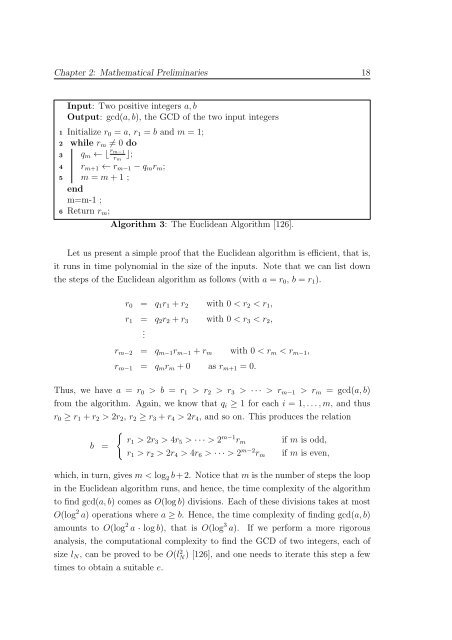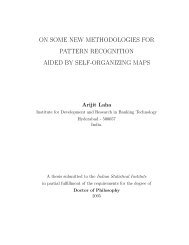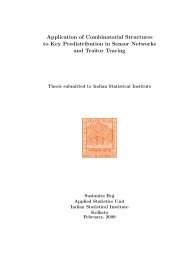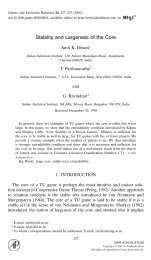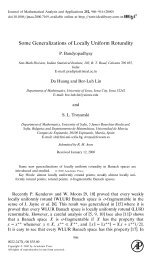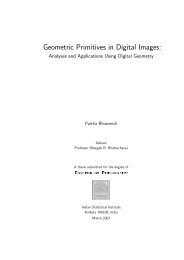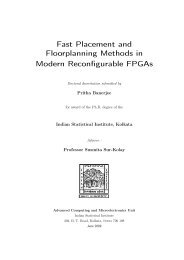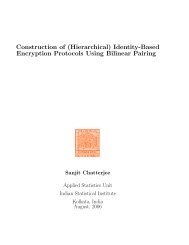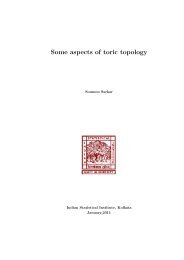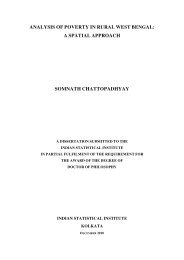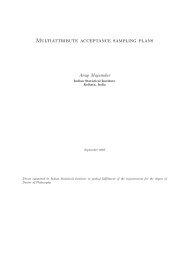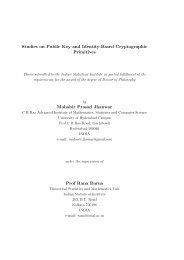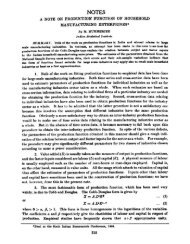Cryptanalysis of RSA Factorization - Library(ISI Kolkata) - Indian ...
Cryptanalysis of RSA Factorization - Library(ISI Kolkata) - Indian ...
Cryptanalysis of RSA Factorization - Library(ISI Kolkata) - Indian ...
Create successful ePaper yourself
Turn your PDF publications into a flip-book with our unique Google optimized e-Paper software.
Chapter 2: Mathematical Preliminaries 18<br />
1<br />
2<br />
3<br />
4<br />
5<br />
6<br />
Input: Two positive integers a,b<br />
Output: gcd(a,b), the GCD <strong>of</strong> the two input integers<br />
Initialize r 0 = a, r 1 = b and m = 1;<br />
while r m ≠ 0 do<br />
q m ← ⌊ r m−1<br />
r m<br />
⌋;<br />
r m+1 ← r m−1 −q m r m ;<br />
m = m+1 ;<br />
end<br />
m=m-1 ;<br />
Return r m ;<br />
Algorithm 3: The Euclidean Algorithm [126].<br />
Let us present a simple pro<strong>of</strong> that the Euclidean algorithm is efficient, that is,<br />
it runs in time polynomial in the size <strong>of</strong> the inputs. Note that we can list down<br />
the steps <strong>of</strong> the Euclidean algorithm as follows (with a = r 0 , b = r 1 ).<br />
r 0 = q 1 r 1 +r 2 with 0 < r 2 < r 1 ,<br />
r 1 = q 2 r 2 +r 3 with 0 < r 3 < r 2 ,<br />
.<br />
r m−2 = q m−1 r m−1 +r m with 0 < r m < r m−1 ,<br />
r m−1 = q m r m +0 as r m+1 = 0.<br />
Thus, we have a = r 0 > b = r 1 > r 2 > r 3 > ··· > r m−1 > r m = gcd(a,b)<br />
from the algorithm. Again, we know that q i ≥ 1 for each i = 1,...,m, and thus<br />
r 0 ≥ r 1 +r 2 > 2r 2 , r 2 ≥ r 3 +r 4 > 2r 4 , and so on. This produces the relation<br />
b =<br />
{<br />
r 1 > 2r 3 > 4r 5 > ··· > 2 m−1 r m<br />
r 1 > r 2 > 2r 4 > 4r 6 > ··· > 2 m−2 r m<br />
if m is odd,<br />
if m is even,<br />
which, in turn, gives m < log 2 b+2. Notice that m is the number <strong>of</strong> steps the loop<br />
in the Euclidean algorithm runs, and hence, the time complexity <strong>of</strong> the algorithm<br />
to find gcd(a,b) comes as O(logb) divisions. Each <strong>of</strong> these divisions takes at most<br />
O(log 2 a) operations where a ≥ b. Hence, the time complexity <strong>of</strong> finding gcd(a,b)<br />
amounts to O(log 2 a · logb), that is O(log 3 a). If we perform a more rigorous<br />
analysis, the computational complexity to find the GCD <strong>of</strong> two integers, each <strong>of</strong><br />
size l N , can be proved to be O(l 2 N ) [126], and one needs to iterate this step a few<br />
times to obtain a suitable e.


